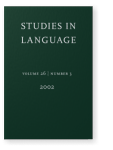Vol. 26:3 (2002) ► pp.513–541
Discourse-pragmatic principles for temporal reference in Mandarin Chinese conversation
This study investigates the Mandarin temporal system in ordinary conversations. It is found that during the dynamic time course of interaction, Mandarin speakers tend to rely more heavily on certain underlying principles, rather than on overt markers, to convey temporal location: In a narrative context, temporal reference is almost always established at the beginning of the story and is not subsequently changed, provided that there is a continuity of action across the verbs. In contexts where turn-by-turn talk is at work, speakers tend to establish the time reference through the inherent semantics of the verbs being employed. The data also suggest that other factors, such as shared knowledge and discourse co-text, appear to play a significant role in helping disambiguate the temporal standpoint of utterances which otherwise have potentially competing temporal anchors.
Cited by
Cited by 8 other publications
This list is based on CrossRef data as of 16 june 2024. Please note that it may not be complete. Sources presented here have been supplied by the respective publishers. Any errors therein should be reported to them.
